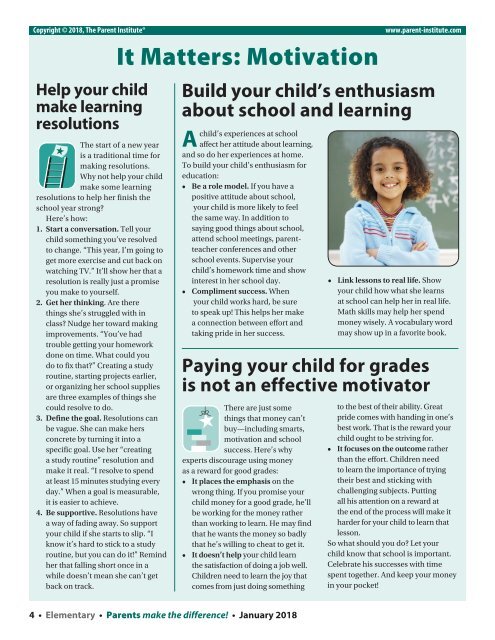Elementary School Parents Magazine
You also want an ePaper? Increase the reach of your titles
YUMPU automatically turns print PDFs into web optimized ePapers that Google loves.
Copyright © 2018, The Parent Institute®<br />
Help your child<br />
make learning<br />
resolutions<br />
The start of a new year<br />
is a traditional time for<br />
making resolutions.<br />
Why not help your child<br />
make some learning<br />
resolutions to help her finish the<br />
school year strong?<br />
Here’s how:<br />
1. Start a conversation. Tell your<br />
child something you’ve resolved<br />
to change. “This year, I’m going to<br />
get more exercise and cut back on<br />
watching TV.” It’ll show her that a<br />
resolution is really just a promise<br />
you make to yourself.<br />
2. Get her thinking. Are there<br />
things she’s struggled with in<br />
class? Nudge her toward making<br />
improvements. “You’ve had<br />
trouble getting your homework<br />
done on time. What could you<br />
do to fix that?” Creating a study<br />
routine, starting projects earlier,<br />
or organizing her school supplies<br />
are three examples of things she<br />
could resolve to do.<br />
3. Define the goal. Resolutions can<br />
be vague. She can make hers<br />
concrete by turning it into a<br />
specific goal. Use her “creating<br />
a study routine” resolution and<br />
make it real. “I resolve to spend<br />
at least 15 minutes studying every<br />
day.” When a goal is measurable,<br />
it is easier to achieve.<br />
4. Be supportive. Resolutions have<br />
a way of fading away. So support<br />
your child if she starts to slip. “I<br />
know it’s hard to stick to a study<br />
routine, but you can do it!” Remind<br />
her that falling short once in a<br />
while doesn’t mean she can’t get<br />
back on track.<br />
It Matters: Motivation<br />
child’s experiences at school<br />
A affect her attitude about learning,<br />
and so do her experiences at home.<br />
To build your child’s enthusiasm for<br />
education:<br />
• Be a role model. If you have a<br />
positive attitude about school,<br />
your child is more likely to feel<br />
the same way. In addition to<br />
saying good things about school,<br />
attend school meetings, parentteacher<br />
conferences and other<br />
school events. Supervise your<br />
child’s homework time and show<br />
interest in her school day.<br />
• Compliment success. When<br />
your child works hard, be sure<br />
to speak up! This helps her make<br />
a connection between effort and<br />
taking pride in her success.<br />
There are just some<br />
things that money can’t<br />
buy—including smarts,<br />
motivation and school<br />
success. Here’s why<br />
experts discourage using money<br />
as a reward for good grades:<br />
• It places the emphasis on the<br />
wrong thing. If you promise your<br />
child money for a good grade, he’ll<br />
be working for the money rather<br />
than working to learn. He may find<br />
that he wants the money so badly<br />
that he’s willing to cheat to get it.<br />
• It doesn’t help your child learn<br />
the satisfaction of doing a job well.<br />
Children need to learn the joy that<br />
comes from just doing something<br />
www.parent-institute.com<br />
Build your child’s enthusiasm<br />
about school and learning<br />
• Link lessons to real life. Show<br />
your child how what she learns<br />
at school can help her in real life.<br />
Math skills may help her spend<br />
money wisely. A vocabulary word<br />
may show up in a favorite book.<br />
Paying your child for grades<br />
is not an effective motivator<br />
to the best of their ability. Great<br />
pride comes with handing in one’s<br />
best work. That is the reward your<br />
child ought to be striving for.<br />
• It focuses on the outcome rather<br />
than the effort. Children need<br />
to learn the importance of trying<br />
their best and sticking with<br />
challenging subjects. Putting<br />
all his attention on a reward at<br />
the end of the process will make it<br />
harder for your child to learn that<br />
lesson.<br />
So what should you do? Let your<br />
child know that school is important.<br />
Celebrate his successes with time<br />
spent together. And keep your money<br />
in your pocket!<br />
4 • <strong>Elementary</strong> • <strong>Parents</strong> make the difference! • January 2018
















